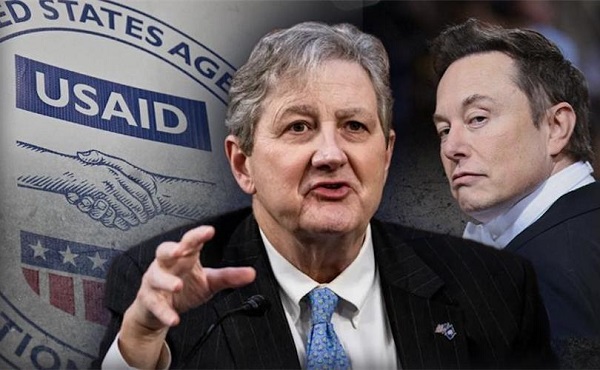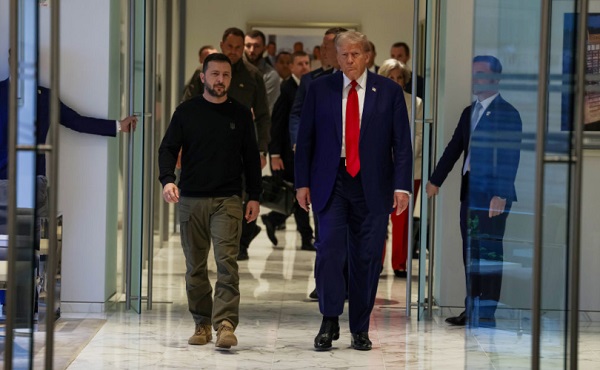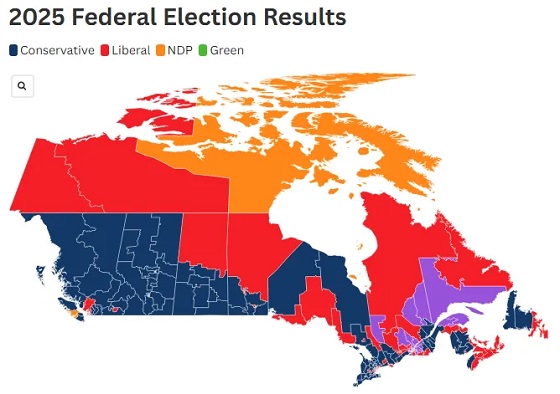Business
Republican senator details millions USAID spent on LGBT activism, terrorist groups

From LifeSiteNews
Expenditures include $2 million for “sex change” operations in Guatemala, $20 million for a Sesame Street-type children’s show in Iraq, $7.9 million to train media in Sri Lanka not to use “gendered” language, $1.5 million for LGBT activism in Jamaica, $3.9 million for LGBT activism in Macedonia, and even $10 million for meals for the Nusra front, an al-Qaeda-linked terrorist group in Syria.
U.S. Sen. John Kennedy (R-LA) took to the Senate floor to detail just some of ways the U.S. Agency for International Development (USAID) has been using American taxpayer dollars without the public’s knowledge or approval, making the case that it more than vindicates the Trump administration’s foreign aid freeze.
The Trump State Department recently issued a 90-day freeze on foreign aid disbursed through USAID, citing millions in waste and ideologically-biased programs. With exceptions for certain food programs and military aid to Israel and Egypt, the pause is meant to give the administration time to conduct a more thorough review of foreign aid to determine what permanent cuts should be made.
On February 6, Kennedy highlighted several examples of USAID funding uncovered by Elon Musk’s Department of Government Efficiency (DOGE) advisory group, which dramatically contrast with the popular assumption that USAID merely offers help to the poor and sick around the world.
Musk “found that USAID gave money to support electric vehicles in Vietnam—our money, taxpayer money,” Kennedy said. “He found that USAID gave money to a transgender clinic in India. I didn’t know that. I bet you the American people didn’t know that.
“He found that USAID gave $1.5 million to a Serbian LGBTQ group,” he continued. “They got $1.5 million to ‘advance diversity, equity, and inclusion in Serbia’s workplaces and business communities.’ What else did Mr. Musk find that my colleagues don’t want to talk about?”
Other expenditures include $2 million for “sex change” operations in Guatemala, $20 million for a Sesame Street-type children’s show in Iraq, $7.9 million to train media in Sri Lanka not to use “gendered” language, $1.5 million for LGBT activism in Jamaica, $3.9 million for LGBT activism in Macedonia, and even $10 million for meals for the Nusra front, an al-Qaeda-linked terrorist group in Syria.
“We’re not talking Cub Scout troops here,” Kennedy said of $122 million that USAID distributed to groups linked to terrorism, including “organizations in Gaza controlled by Hamas […] Why? Why? Why aren’t my colleagues talking about that? Can anyone answer that? Recipients of the money they found have, quote, ‘called for their lands to be cleansed from the impurity of Jews.’ That’s who we’re giving foreign aid to?”
“This has been going on for a week,” Kennedy told his colleagues. “People have been screaming like they’re part of a prison riot. ‘Oh, my God, look at what Musk is doing. He’s looking at the spending.’ And I’ve listened to people talk about the process and debate whether it’s constitutional and discuss how many lawyers can dance on the head of a pen. But you know what? I haven’t heard one single person who’s upset with President Trump or Mr. Musk talk about what he’s found.”
“Now, I am not saying everything that USAID does is wasted, but I am saying a lot of it is—a h-ll of a lot of it is—and we ought to be on the floor of this United States Senate thanking Mr. Musk, and we ought to be asking him to go through every agency and look at everybody’s budget—everybody’s budget,” the senator said.
As LifeSiteNews previously covered, the Biden administration also directed millions of dollars to pro-abortion organizations through USAID. Over the weekend, however, a federal judge temporarily blocked the administration from putting USAID employees on paid leave, in which critics are calling a particularly extreme case of judicial overreach.
Business
China’s economy takes a hit as factories experience sharp decline in orders following Trump tariffs

Quick Hit:
President Trump’s tariffs on Chinese imports are delivering a direct blow to China’s economy, with new data showing factory activity dropping sharply in April. The fallout signals growing pressure on Beijing as it struggles to prop up a slowing economy amid a bruising trade standoff.
Key Details:
- China’s manufacturing index plunged to 49.0 in April — the steepest monthly decline in over a year.
- Orders for Chinese exports hit their lowest point since the Covid-19 pandemic, according to official data.
- U.S. tariffs on Chinese goods have reached 145%, with China retaliating at 125%, intensifying the standoff.
Diving Deeper:
Three weeks into a high-stakes trade war, President Trump’s aggressive tariff strategy is showing early signs of success — at least when it comes to putting economic pressure on America’s chief global rival. A new report from China’s National Bureau of Statistics shows the country’s manufacturing sector suffered its sharpest monthly slowdown in over a year. The cause? A dramatic drop in new export orders from the United States, where tariffs on Chinese-made goods have soared to 145%.
The manufacturing purchasing managers’ index fell to 49.0 in April — a contraction level that underlines just how deeply U.S. tariffs are biting. It’s the first clear sign from China’s own official data that the trade measures imposed by President Trump are starting to weaken the export-reliant Chinese economy. A sub-index measuring new export orders reached its lowest point since the Covid-19 pandemic, and factory employment fell to levels not seen since early 2024.
Despite retaliatory tariffs of 125% on U.S. goods, Beijing appears to be scrambling to shore up its economy. China’s government has unveiled a series of internal stimulus measures to boost consumer spending and stabilize employment. These include pension increases, subsidies, and a new law promising more protection for private businesses — a clear sign that confidence among Chinese entrepreneurs is eroding under Xi Jinping’s increasing centralization of economic power.
President Trump, on the other hand, remains defiant. “China was ripping us off like nobody’s ever ripped us off,” he said Tuesday in an interview, dismissing concerns that his policies would harm American consumers. He predicted Beijing would “eat those tariffs,” a statement that appears more prescient as China’s economic woes grow more apparent.
Still, the impact is not one-sided. Major U.S. companies like UPS and General Motors have warned of job cuts and revised earnings projections, respectively. Consumer confidence has also dipped. Yet the broader strategy from the Trump administration appears to be focused on playing the long game — applying sustained pressure on China to level the playing field for American workers and businesses.
Economists are warning of potential global fallout if the trade dispute lingers. However, Beijing may have more to lose. Analysts at Capital Economics now predict China’s growth will fall well short of its 5% target for the year, citing the strain on exports and weak domestic consumption. Meanwhile, Nomura Securities estimates up to 15.8 million Chinese jobs could be at risk if U.S. exports continue to decline.
Business
Scott Bessent says U.S., Ukraine “ready to sign” rare earths deal

 MxM News
MxM News
Quick Hit:
During Wednesday’s Cabinet meeting, Treasury Secretary Scott Bessent said the U.S. is prepared to move forward with a minerals agreement with Ukraine. President Trump has framed the deal as a way to recover U.S. aid and establish an American presence to deter Russian threats.
Key Details:
-
Bessent confirmed during a Cabinet meeting that the U.S. is “ready to sign this afternoon,” even as Ukrainian officials introduced last-minute changes to the agreement. “We’re sure that they will reconsider that,” he added during the Cabinet discussion.
-
Ukrainian Economy Minister Yulia Svyrydenko was reportedly in Washington on Wednesday to iron out remaining details with American officials.
-
The deal is expected to outline a rare earth mineral partnership between Washington and Kyiv, with Ukrainian Armed Forces Lt. Denis Yaroslavsky calling it a potential turning point: “The minerals deal is the first step. Ukraine should sign it on an equal basis. Russia is afraid of this deal.”
Diving Deeper:
The United States is poised to sign a long-anticipated rare earth minerals agreement with Ukraine, Treasury Secretary Scott Bessent announced during a Cabinet meeting on Wednesday. According to Bessent, Ukrainians introduced “last minute changes” late Tuesday night, complicating the final phase of negotiations. Still, he emphasized the U.S. remains prepared to move forward: “We’re sure that they will reconsider that, and we are ready to sign this afternoon.”
As first reported by Ukrainian media and confirmed by multiple Ukrainian officials, Economy Minister Yulia Svyrydenko is in Washington this week for the final stages of negotiations. “We are finalizing the last details with our American colleagues,” Ukrainian Prime Minister Denys Shmyhal told Telemarathon.
The deal follows months of complex talks that nearly collapsed earlier this year. In February, President Trump dispatched top officials, including Bessent, to meet with President Volodymyr Zelensky in Ukraine to hammer out terms. According to officials familiar with the matter, Trump grew frustrated when Kyiv initially refused U.S. conditions. Still, the two sides ultimately reached what Bessent described as an “improved” version of the deal by late February.
The effort nearly fell apart again during Zelensky’s February 28th visit to the White House, where a heated Oval Office exchange between the Ukrainian president, Trump, and Vice President JD Vance led to Zelensky being removed from the building and the deal left unsigned.
Despite those setbacks, the deal appears to be back on track. While no public text of the agreement has been released, the framework is expected to center on U.S.-Ukraine cooperation in extracting rare earth minerals—resources vital to modern manufacturing, electronics, and defense technologies.
President Trump has publicly defended the arrangement as a strategic and financial win for the United States. “We want something for our efforts beyond what you would think would be acceptable, and we said, ‘rare earth, they’re very good,’” he said during the Cabinet meeting. “It’s also good for them, because you’ll have an American presence at the site and the American presence will keep a lot of bad actors out of the country—or certainly out of the area where we’re doing the digging.”
Trump has emphasized that the deal would serve as a form of “security guarantee” for Ukraine, providing a stabilizing American footprint amid ongoing Russian aggression. He framed it as a tangible return on the billions in U.S. aid sent to Kyiv since the start of Russia’s 2022 invasion.
-

 Alberta2 days ago
Alberta2 days agoPremier Danielle Smith responds to election of Liberal government
-

 2025 Federal Election2 days ago
2025 Federal Election2 days agoIn Defeat, Joe Tay’s Campaign Becomes a Flashpoint for Suspected Voter Intimidation in Canada
-

 Banks1 day ago
Banks1 day agoTD Bank Account Closures Expose Chinese Hybrid Warfare Threat
-

 Alberta1 day ago
Alberta1 day agoHours after Liberal election win, Alberta Prosperity Project drumming up interest in referendum
-

 2025 Federal Election1 day ago
2025 Federal Election1 day agoPost election…the chips fell where they fell
-

 2025 Federal Election2 days ago
2025 Federal Election2 days agoPoilievre loses seat but plans to stay on as Conservative leader
-

 Alberta1 day ago
Alberta1 day agoNew Alberta Election Act bans electronic vote counting machines, lowers threshold for recalls and petitions
-

 espionage12 hours ago
espionage12 hours agoLongtime Liberal MP Warns of Existential Threat to Canada, Suggests Trump’s ’51st State’ Jibes Boosted Carney




